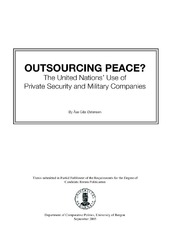| dc.description.abstract | Private companies provide security and military services to states, international organizations, international non-governmental organizations, and individuals. This thesis addresses the United Nation’s use of private security and military companies. The study looks into the characteristics of this practice and subsequently provides some explanations for the pattern and rationale thereof. The systematization of compiled data on 32 contracts between the UN and private security and military companies (PSCs and PMCs) reveals that three main categories of services are supplied; Security services, logistic and support services, and what is here collectively termed expert services. The analytical framework deployed focuses both on enhanced need on part of the UN, and on enhanced offer from the private sector. The role of the private security and military industry has evolved substantially since the beginning of the 1990s when the phenomenon was first paid attention to in academic writing. In order to explain the UN’s use of these companies, both the UN organization and the industry as such is subject to examination. A twofold analytical framework is thus presented. Interviews and official documents are used to examine the validity of five propositions derived from the analytical framework. The propositions regarding UN demand suggest both radicalized external operating environments and internal organizational capacities have contributed to the UN deploying PSCs and PMCs. On the supply side, the last set of propositions indicate that comprehensive image refinement efforts on part of the industry have added to the UN deploying these companies, while quantitative expansion of the industry does not appear to influence UN PSC/PMC contracting in a direct manner. This thesis thus argues that the UN’s use of PSCs and PMCs can be explained by the UN simultaneously facing more difficult premises for its operations, enhanced expectations for action, and proportionally deteriorated internal capacity. The private security and military industry on its part has detected the UN potential market and strive to accommodate to the demands of this potentially very profitable market. | en_US |
